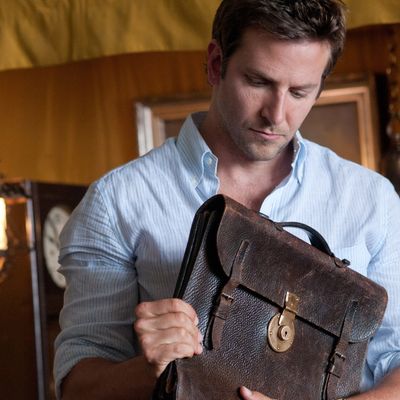
Plagiarism’s all the rage-arism, and here comes The Words to turn the cosmic gulf between a writer’s longing to be a Writer and his meager talent into a high-toned melodrama about a guy (Bradley Cooper) who publishes someone else’s work as his own and becomes the toast of actors with bad upper-class accents. The movie, written and directed by Brian Klugman and Lee Sternthal, is desultory when it’s not inept, but the set-up is so good that you can’t help sticking it out to the (unforgivable) end.
The Words opens not with the writer protagonist but another famous writer who reads a story about the writer protagonist to a rapt audience that includes a worshipful grad student. The famous writer is played by Dennis Quaid, who’s never convincing as a brain, the dishy grad student by Olivia Wilde, who’s never convincing as a human.
Cooper (who co-produced) isn’t much more believable as the would-be author on the (grudging) parental dole who finds an aged, typewritten manuscript in a briefcase bought at a Paris junk shop. He reads it, he emotes. His blue eyes turn bloodshot. It’s so much better, so much more real, than anything he could ever write. He types it into his word processor just to, you know, feel the words go through him. I’m sure you’ve done the same thing — I’m halfway through typing Infinite Jest as I write this. Then his wife (Zoe Saldana) reads the book off his screen when he’s at the office (he works in the mail room at a literary agency) and hugs him, tears running down her face. “There are parts of you in this novel that I always knew were there but I’d never seen before,” she says, to which he responds, “Ah … um … er … You really liked it?”
The Words is rife with terrible moments, some featuring Jeremy Irons, whose old-age makeup is so obvious that I was sure it was a disguise he was going to wipe off. But Irons is peerless — even with an iffy American accent — at making his words curdle in the air (“You are some writer, my friend”), twisting the knife in the hapless fraud Cooper in a way that’s very satisfying — although not up there with watching Oprah sorrowfully flay James Frey. Then Irons tells a story (which means it’s a story within a story) and the mystery of the found manuscript is revealed. Set in the forties, it features shots of a young soldier left behind as a train pulls away and, later, in a T-shirt enfolding his wife in his manly arms. I’ve seen those shots in scores of other movies, but then, there’s nothing original under the sun — including that line.
I didn’t understand the ending — or, for that matter, the function of the wraparound Quaid story beyond padding out the running time. Is the big reveal that Quaid is Cooper? If so, why does that matter? Post your explanations in the comments section below. And don’t lift them from IMDb or some other site without attribution as I have anti-plagiarism software. You can’t be too careful, as many people have said.





